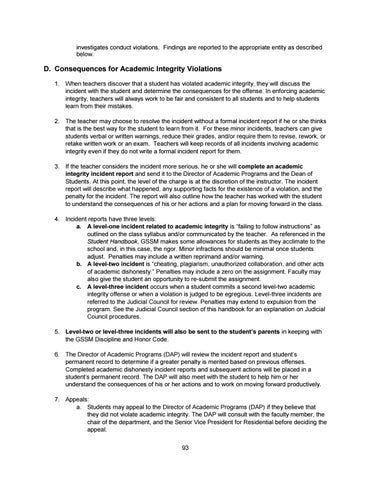investigates conduct violations. Findings are reported to the appropriate entity as described below.
D. Consequences for Academic Integrity Violations 1. When teachers discover that a student has violated academic integrity, they will discuss the incident with the student and determine the consequences for the offense. In enforcing academic integrity, teachers will always work to be fair and consistent to all students and to help students learn from their mistakes. 2. The teacher may choose to resolve the incident without a formal incident report if he or she thinks that is the best way for the student to learn from it. For these minor incidents, teachers can give students verbal or written warnings, reduce their grades, and/or require them to revise, rework, or retake written work or an exam. Teachers will keep records of all incidents involving academic integrity even if they do not write a formal incident report for them. 3. If the teacher considers the incident more serious, he or she will complete an academic integrity incident report and send it to the Director of Academic Programs and the Dean of Students. At this point, the level of the charge is at the discretion of the instructor. The incident report will describe what happened, any supporting facts for the existence of a violation, and the penalty for the incident. The report will also outline how the teacher has worked with the student to understand the consequences of his or her actions and a plan for moving forward in the class. 4. Incident reports have three levels: a. A level-one incident related to academic integrity is “failing to follow instructions” as outlined on the class syllabus and/or communicated by the teacher. As referenced in the Student Handbook, GSSM makes some allowances for students as they acclimate to the school and, in this case, the rigor. Minor infractions should be minimal once students adjust. Penalties may include a written reprimand and/or warning. b. A level-two incident is “cheating, plagiarism, unauthorized collaboration, and other acts of academic dishonesty.” Penalties may include a zero on the assignment. Faculty may also give the student an opportunity to re-submit the assignment. c. A level-three incident occurs when a student commits a second level-two academic integrity offense or when a violation is judged to be egregious. Level-three incidents are referred to the Judicial Council for review. Penalties may extend to expulsion from the program. See the Judicial Council section of this handbook for an explanation on Judicial Council procedures. 5. Level-two or level-three incidents will also be sent to the student’s parents in keeping with the GSSM Discipline and Honor Code. 6. The Director of Academic Programs (DAP) will review the incident report and student’s permanent record to determine if a greater penalty is merited based on previous offenses. Completed academic dishonesty incident reports and subsequent actions will be placed in a student’s permanent record. The DAP will also meet with the student to help him or her understand the consequences of his or her actions and to work on moving forward productively. 7. Appeals: a. Students may appeal to the Director of Academic Programs (DAP) if they believe that they did not violate academic integrity. The DAP will consult with the faculty member, the chair of the department, and the Senior Vice President for Residential before deciding the appeal. 93


